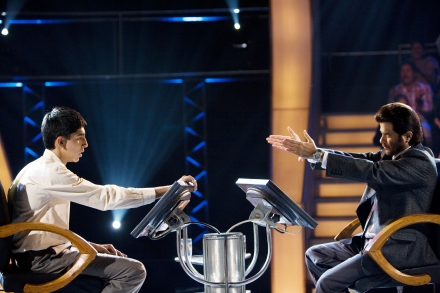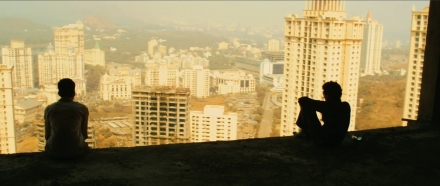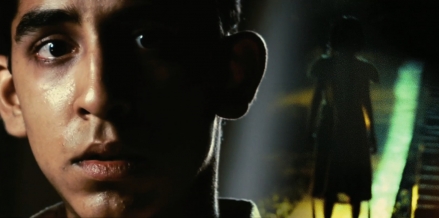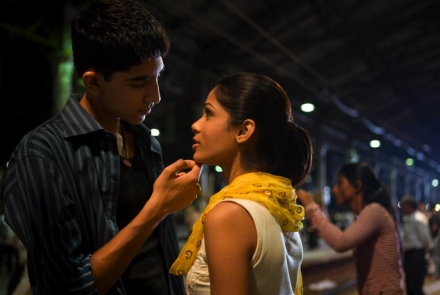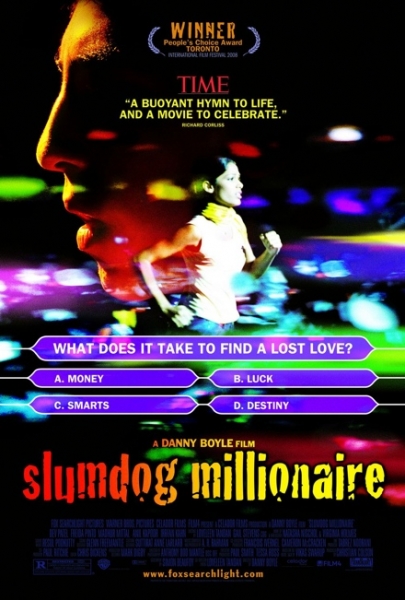Interview With Slumdog Millionaire Director Danny Boyle
I had the opportunity to sit down one on one with director Danny Boyle at the 2008 Toronto International Film Festival. We talked about his new film, Slumdog Millionaire, which hit theaters this week in some markets. I even got a chance to ask him about a third film in the 28 Days Later series.
Peter Sciretta: I had talked to you before this film became such a film festival success. Everybody seems to love it.Danny Boyle: I feel a little bit numb really, you know. It was like four weeks ago we were dead and buried in Central North America really. We were dead and you couldn't really see any way out of it because Warner Bros is a big studio. They don't know how to release this kind of film. And then we had the grace, thank God, to show it to Peter Rice who was like, "Fox Searchlight are the experts". You couldn't dream of somebody like that to release this kind of film. And they put it in Telluride, in [Toronto] and you get the kind of responses that we've had. It's unbelievable really, and it's a funny place, India, making the film there. These kind of things happen and there is a kind of reason that they happen. And you can't quite explain — and you sound like a bit of a hippie idiot when you start going on about it, but there is– it's bizarre the way it works.Peter Sciretta: So as they say "it's written."Danny Boyle: [Laughs] Well, that's what I mean. It's really weird. And it's happened on a number of occasions to us throughout the making of the film. And you have to be prepared for it. You have to be relaxed and actually accept your destiny is going to be written in a funny kind of way. Rather than going around screaming and shouting about, blaming people and all these kind of things. You have to relax and trust that you've been honest and respectful in a way that you've made the film, and that it'll find it's way. And so far it seems to be doing that thank God, yeah. So it's weird, very weird. So hence, I feel a bit numb. I'm not quite sure, I kind of feel a bit dazzled really, and I shouldn't be.Peter Sciretta: When I first heard about the film, the only thing that really attracted me to it was your name. Because at first glance, the concept of Who Wants To Be A Millionaire...Danny Boyle: Yeah, I felt the same way about that show. Yeah, I thought, I don't want to film about that show. It's like I don't know whether I like that show, I don't think I do. I know when I watch it, it's kind of compulsive viewing and there's something vile about it and– but there's also something wonderful about it which is why it's a huge success around the world. And the great thing about it is you can tell the underdog story through it, because– and obviously that's what we use it for is a device by which an underdog, a guy who apparently has nothing, climbs this ladder, apparently, and you climb it with him. And some of the questions and answers you can work out, and some of them are guesses. But because he's got that relaxed thing I was talking about, about the beginning, about being kind of– he's got that as well because his agenda for being on the show isn't just to win the money, it's something else as well. And because he's after that, he's kind of like, "Okay, I'll guess," and he gets it right. Anyway...Peter Sciretta: So you had hesitations going in to this. What made you choose this project?Danny Boyle: They sent the scripts, and my agent, I think says, if I remember it, they said, It's about "Who Wants to be a Millionaire." And I said, "Why would I want to make a film about that?" But I saw his name on it, Simon Beaufoy's name, and he'd written The Full Monty, and I knew his work, and I thought, that's– there aren't many really good writers in Britain. I thought I should read it out of respect for him and then I can write him a note or something. And seriously, page 20, I was like in. I just knew, I– what I say is you get this kind of like, the really great decisions you make, you get this common sense amnesia, like, then it just goes out the window. It's like they say women after childbirth, what this drug is released in them that makes them forget all the pain they've been through. It's a bit like the pain of making a film is nowhere apparent. You say, "Oh, I'll do that, that's amazing. What a great story." And I was in, I could feel it. And then your job is to try and get– make the audiences feel like you felt when you first read that script, that feeling you got, wow, the journey. It's unexpected and it kind of evades you, and then suddenly you realize, I love the complexity of it like that and the big high it has, the underdog story and the love story.
Peter Sciretta: The thing is, it really isn't about a game show at all.Danny Boyle: At all, no. It's just a device. It's just a device and the guy who runs it is an absolute c**t He starts off being all smarmy, but actually he's an egomaniac, and you realize that's what the show is. It's kind of like, it's supposed to be bigger than its contestants, where as in this case this contestant is bigger than the show.Peter Sciretta: I've never seen India like It was photographed in your film. It was incredibly vivid, you see everything from the the slums to the Taj Mahal.Danny Boyle: And also the incredible development that's going on though, they're building tower blocks daily, just springing up. The whole landscape's changing. It's in flux, enormous flux and they, as an economy. At the moment obviously, the biggest economy in the world is America, and everybody knows about China. But India's right behind you guys and it's coming. There's going to be a lot of changes in the world in the next 50 years. So it's amazing to make a film that's actually kind of a little bit– looks a little bit into that.
Peter Sciretta: It's funny, because you don't only just touch upon the landscape, but also explore the reason – outsourcing, which ends up as part of the story.Danny Boyle: Yeah. Very much so, it's a key part of it. These incredible call centers. I didn't realize... We went in these call centers, it's just so stupid, so obvious. The call center tradition is you ring up someone, you get this strange sounding person pretending to be familiar with you and your culture, and they're not. They're millions of miles away. But that's not their main job. Their main job is when you book a ticket on virgin.com or amazon.com, when you place an order, it's goes through India. So they don't have to talk to you, it's just computers. That's the vast majority of their work. And I never realized that, seems so obvious. I take it so for granted that when I order a book on amazon.com, or wherever you know, that order...Peter Sciretta: Oh really? So you're saying it's not just the people talking to you, it's also the people processing.Danny Boyle: Well that's just proportion of it. It's the processing is the major part of it, which I didn't realize. When you book a rail ticket online, it goes through India before it comes back to you.Peter Sciretta: I didn't know that.Danny Boyle: I know, it's absolutely amazing, isn't it?Peter Sciretta: It is pretty amazing.Danny Boyle: There was no way we could show that in the story, but, so we go for the comic version which is he gets this Scottish woman on the– with a really fake Scottish accent, and he's trying to talk to her in his Indian accent.Peter Sciretta: There must have been a lot of challenges shooting it in India. I've heard India is pretty strict when it comes to film projects.
Danny Boyle: Yeah government permission is tricky. One of the legacies the British left was this addiction to beauracracy, like this incredible system of beauracracy, and that's really frustrating. But the biggest thing about it is that– and the attitude, you've got to have the right attitude going in. It is a complex and challenging place, but you've got to embrace it and love it. And if you do, it actually– everything comes back to you. It's an incredibly generous place. It gives you everything back you ever wanted for the movie. You get it, but you can't go in there bullying going, "I'm a f***ing Western film maker and I can make films like this, and it has to be like this." If you go in like that, you're dead. It'll just chew you up and spit you out. But if you can't go in like that, it'll come back to you eventually. It's an amazing place.Peter Sciretta: I was surprised. The film opens with a torture sequence.Danny Boyle: Which goes on all the time. Listen, anything north of a traffic offense, you've got a fairly good chance of having some low level torture on you. Seriously, if you deny accusations, they regularly torture people. And in fact, we're to submit that to the Indian government for permission. And they said, that's fine. They said you must make sure there's nobody above the rank of inspector involved in the torture scene because– and that was it. That was like them saying yeah, it goes on. All the guys do it, but obviously nobody above the rank of inspector. So there you go. And we were around some police cells, and you can see the equipment just sitting there . It's just like, they're not trying to hide it or anything. It's just lying there, these slapper things they have, which are these kind of leather sticks, which they kind of slap the back of people's legs with, really painful, just lying there. I don't know.Peter Sciretta: That's interesting. There's a shot where the kids are running through the streets, and it was from up above. It was just incredible. How were you able to pull some of those shots off in such difficult conditions?Danny Boyle: Well it's very complicated. We tried to get permission to shoot aerial, and they're really paranoid about aerial photography, because of naval bases and all this kind of stuff, and they won't let you shoot. So we applied for permission, and actually we got we– ironically, we got permission. We finally got granted permission to shoot from the helicopter two weeks ago, which took us just 14 months to get permission. That's the beauracracy. But in fact we've been up in a helicopter and shot on the stills camera, this Canon cam, which is like an EOS camera. And it shoots about 11 or 12 frames and you can blend it in the computer and make it look like live action, and that's where we got that material from. So we'd been up illegally . And again you kind of like– you just go with it. At first everybody says there's no way anybody will take you up. There's no way, no way, no way. And eventually you get a guy and that guy allows you to go up there and have a look around, and then you manage to knock off a couple of little shots.
Peter Sciretta: There's a lot of great music in the film...Danny Boyle: Yeah, very proud of that.Peter Sciretta: What was the process of picking out the music?Danny Boyle: I never brag about anything, except the music in my film. I love the music in the films. I'm so proud of it. It means so much to me. And on this one I wanted this guy, he's like a– he's like, he's so famous in India. He's like Michael Jackson, and Tom Cruise and Michael Phelps all rolled into one, he's that famous. And he saw the movie, said the most extraordinary thing about it. He wrote me this email. He said "I watched it last night." He said, "It's like Shaw Shank Redemption." I thought, what? I couldn't work that at all, and I never have quite worked it out. But anyway he obviously loves Shaw Shank Redemption and he loved our film, so thank God. And he came forward and did the music and we worked on the music together and it was really, I think it was lovely for him because he does a lot of Bollywood movies and it was nice to have a slightly different sensibility at work. It was great for me because Bollywood movies use music really proudly and boldly. They don't hide the music. They really use it up front. And so we did that. They're obsessed with rap and A&R music at the moment, so you feel that in there crossed with all these Indian drum rhythms and it's a really interesting mixture. It's a melting pot at the moment, of all these influences. They look at Hollywood. They love Hollywood films. And they realize the standard of Hollywood films is higher and they kind of aspire to that. And they love western music. They love Black music especially out of America. Urban music, they love that sort of stuff. It's a really interesting combination of stuff. And anyway, he did the score for us and we got this girl Mia to do the song "Paper Planes," we bought her song for the middle of the film. And she also sings a couple of– she sings on one of his other songs. And she'd always admired him because she partly grew up in Sri Lanka, so he was a big hero of hers. So it's again that Indian thing it– these things work out. It's just like you think where is all this happening, and I don't really fully understand quite how it's going like this, but it is. And you go with it.Peter Sciretta: The last time I talked to you was for Sunshine. You were telling me how you were interested in doing a 28 Months Later in Russia. Is that still in the works?Danny Boyle: It's a possibility, yeah. There's an idea, yeah. I've got this idea. It's quite a big idea, quite an extreme one as well.Peter Sciretta: Is it very different from the other two?Danny Boyle: Well, I mean because it's part of, what would then be a trilogy I guess. It would have a connection with the other ones obviously. But it would also be different as well. I'd want to make it like that. It's like you want to keep changing and you want to keep some sensibility there because it's– people have been amazingly loyal to the films, they really– and it's lovely, that kind of feeling. But I wouldn't want to do something just because you can do it. I'd want it to be a big, bold idea which would refresh you a bit like the first one when you'd–, like a bit like when you saw the first one and you saw the guy walking around London on his own, and you get this big, bold, freshness of an idea. It's like wow, okay, cool. So yeah, maybe it'll happen.Peter Sciretta: Maybe. Would you be interested in directing that?Danny Boyle: Oh yeah, yeah, I have no– yeah I'd love to. I didn't think I was right to do the second one. I didn't think I was in the right head space, and I was so absorbed in Sunshine, and it took so long, Sunshine. I wasn't in the right headspace for that one. But now I feel, having been through my Indian experience I'm kind of ready to accept my destiny .Peter Sciretta: Well thank you very muchDanny Boyle: Thank you.

